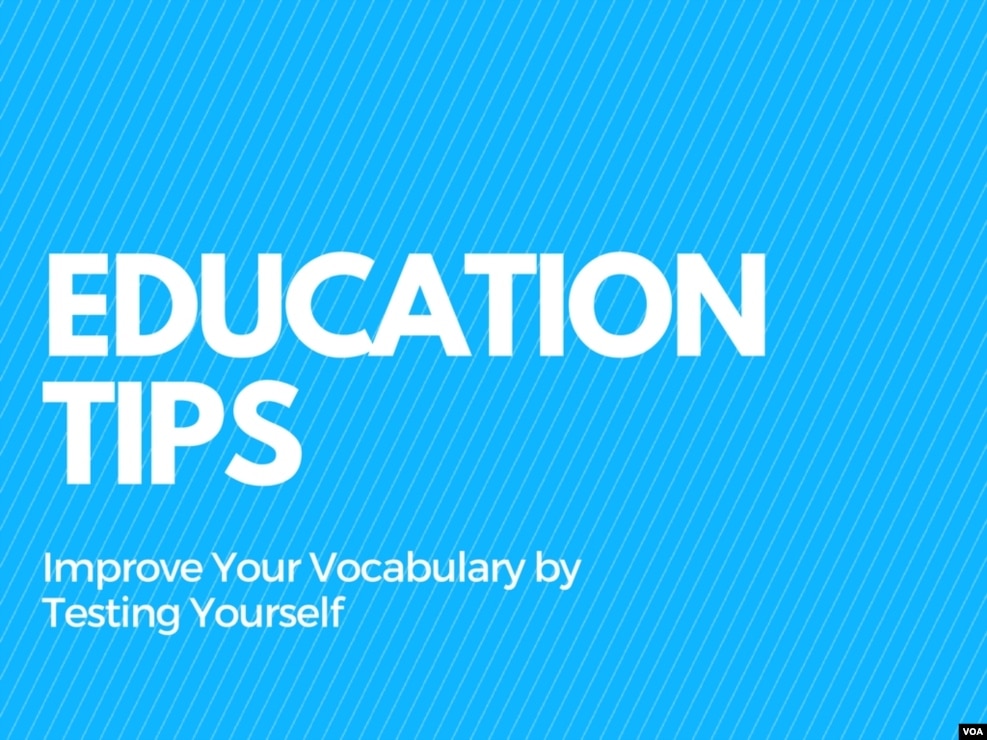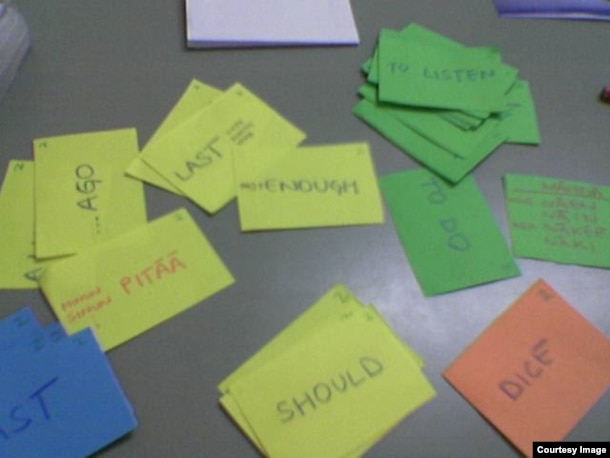
Anyone studying a foreign language knows the importance of memorizing words and expressions in that language.
The more you can remember, the bigger your vocabulary.
Experts say English learners need to develop a large vocabulary to be successful on language tests and at English-speaking universities.
This information comes from Alicia Biler and Ray Knight. They teach at the English Programs for Internationals at the University of South Carolina.
In this Education report, we investigate why English learners need to develop a large vocabulary set. We will also tell you about ideas that teachers and scientists have for learners interested in expanding their understanding of words and expressions.
I Can't Remember That Word!
If you are like many people, you have probably faced a situation like this one in the VOA Learning English series Let's Learn English:
In the video, Anna Matteo has a hard time remembering a word. Perhaps Anna has not heard the word enough times. Perhaps she has not thought about it in a very long time.
Whatever the case, the point is this: it can be difficult to remember and use vocabulary words!
Common challenge
Ray Knight and Alicia Biler report that one of the most common problems English learners face is remembering and using vocabulary words.
Biler says a student's success on proficiency tests and at an English-language university is related to the student's vocabulary.
"English has a wide vocabulary language. Unlike other languages that use more grammar or more word endings to express different meanings, English uses vocabulary to do that job… I think the suggested range for reading a newspaper is around 5,000 words but for students who want to be successful academically, let's say at a university level, they need to know somewhere around 10,000 words."
Biler adds that English learners need to see or hear a word about 10 times before they feel at ease with the word and start using it.
What can you do?
If you need to learn a lot of unfamiliar words, and you have to remember those words, what can you do?
How can you get vocabulary into your long-term memory?
Mary Pyc is a cognitive scientist. She studies human learning.
Pyc says one helpful method for long-term learning is to test yourself. The easiest way to do this, she explains, is to create your own flashcards.
Each card is no bigger than your hand. The word in English can appear on one side of the card. The meaning in your native language can appear on the back.

By repeatedly using flashcards -- and slowly building up the number of cards - you can remember more words. Regular testing will also help you learn which words are difficult for you.
The important point, Pyc says, is that you should not try cramming unfamiliar words if you want to have long-term learning. Cramming is a common method for studying. People try to memorize a lot of information in a hurry before a big test. This strategy can help students on some exams. "But," Pyc notes, "the caveat is that the day later you're not going to remember any of that information."
She had other suggestions about how to improve the learning process, which we will discuss in future education stories.
Try using free online tests
Ray Knight says there are several websites that can help with testing.
He suggests that sites such as Quizlet, Memrise, and English Central can be useful for English learners.
Alicia Biler adds that English learners can be helped by taking free language tests, such as Nation's vocabulary test. While Nation's test does not give you definitive answers about your English abilities, it can help show you where you need to improve, she says.
Building a large vocabulary and getting all that information into long-term memory are not easy tasks.
However, with effort, a little sacrifice, and training you can increase the number of vocabulary words that you know.
In future Education Tips stories, we will explore other effective ways to practice.
I'm John Russell.
John Russell wrote this story for Learning English. George Grow was the editor.
We want to hear from you. Write to us in the Comments Section.
Words in This Story
vocabulary - n. a list or collection of words and expressions
encounter - v. to deal with or experience something
challenge - n. a difficult task or problem
proficiency test - n. a test to see how well you can do something
caveat - n. an explanation or warning that should be remembered when you are doing or thinking about something
Identifying information:
Alisha Biler, Instructor / Reading / Vocabulary Coordinator, English Programs for Internationals, University of South Carolina
Ray Knight, Instructor / Special Projects Coordinator, English Programs for Internationals, University of South Carolina
Mary Pyc, Ph.D., Cognitive Scientist in Target Discovery at Dart NeuroScience.

